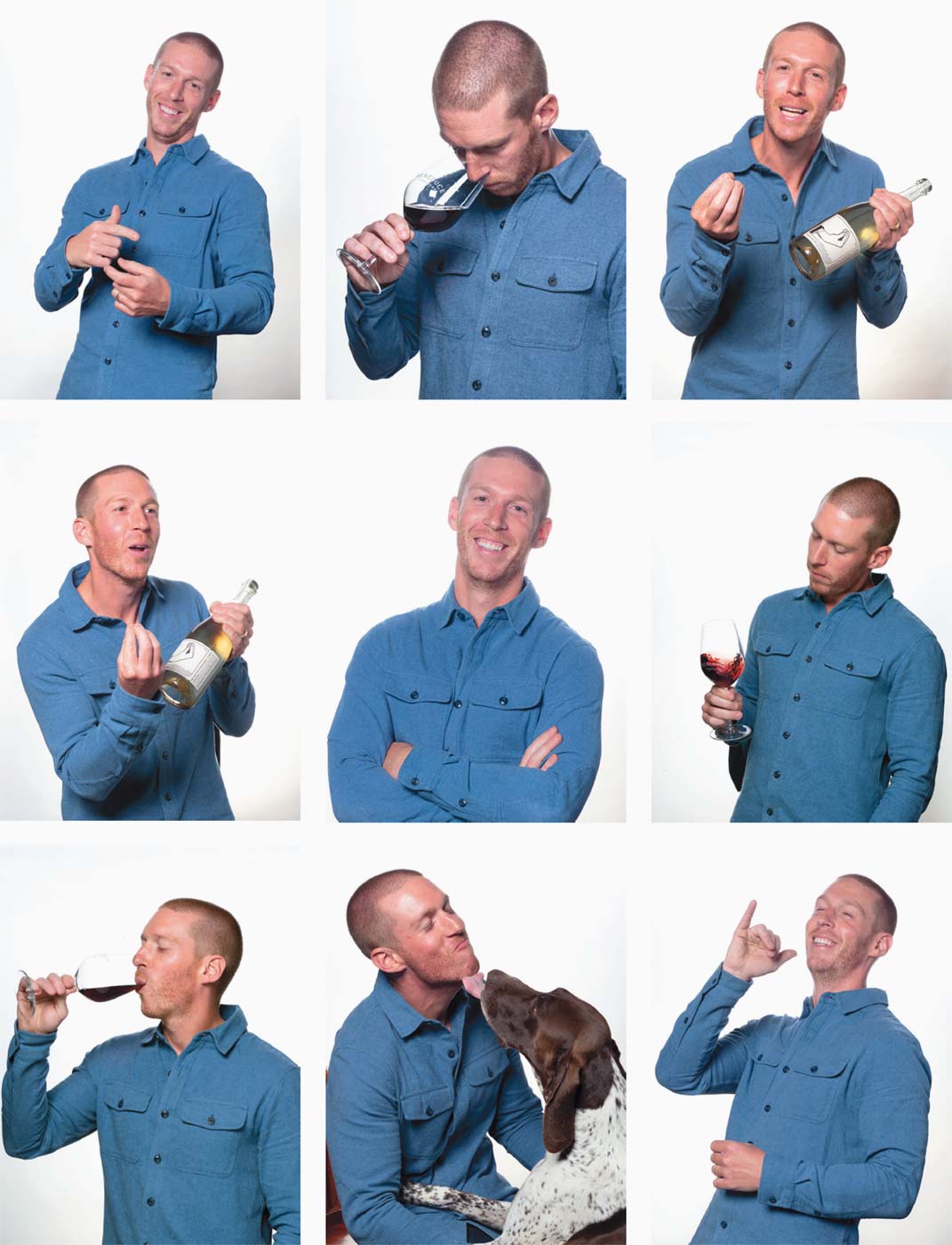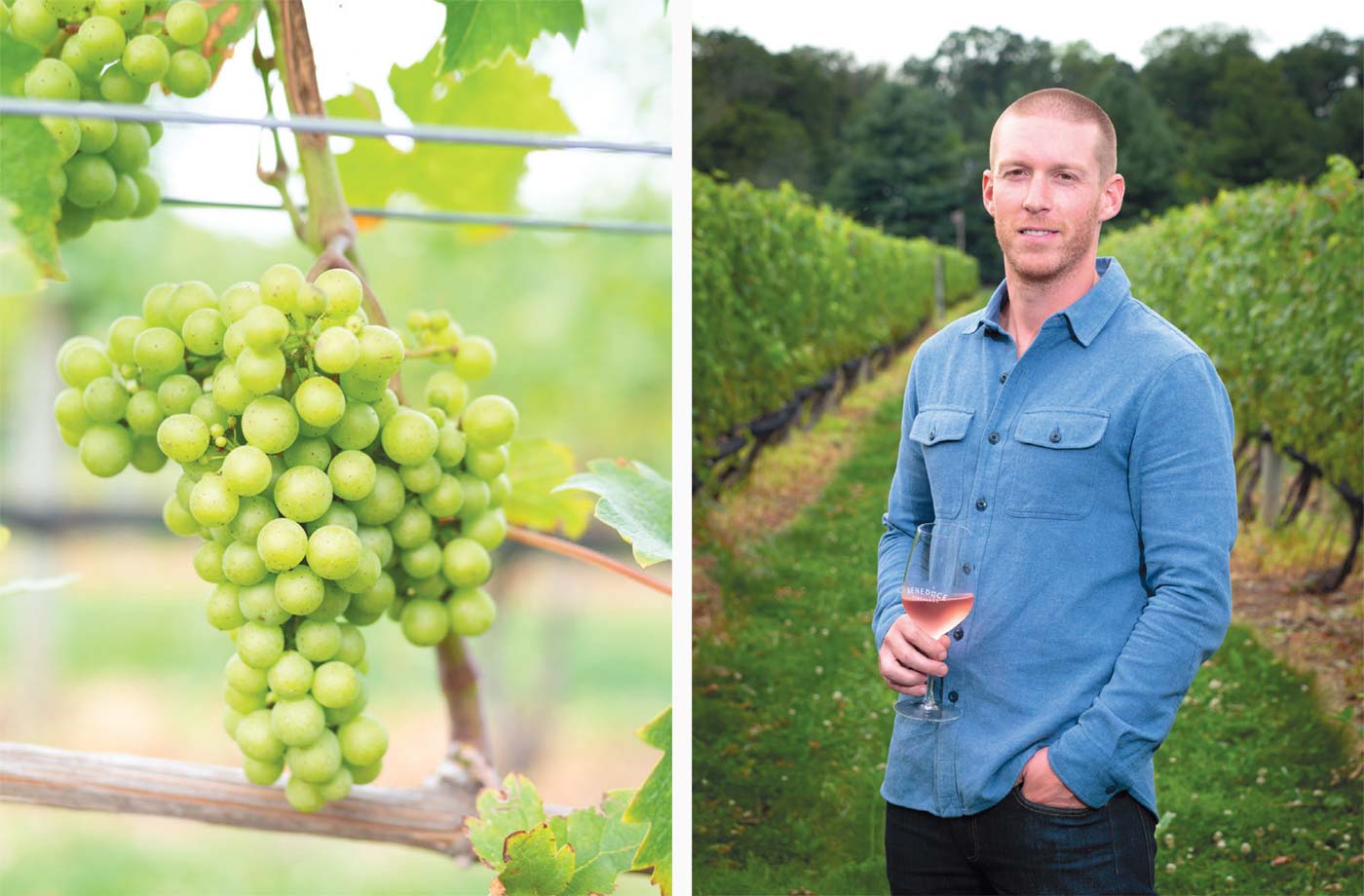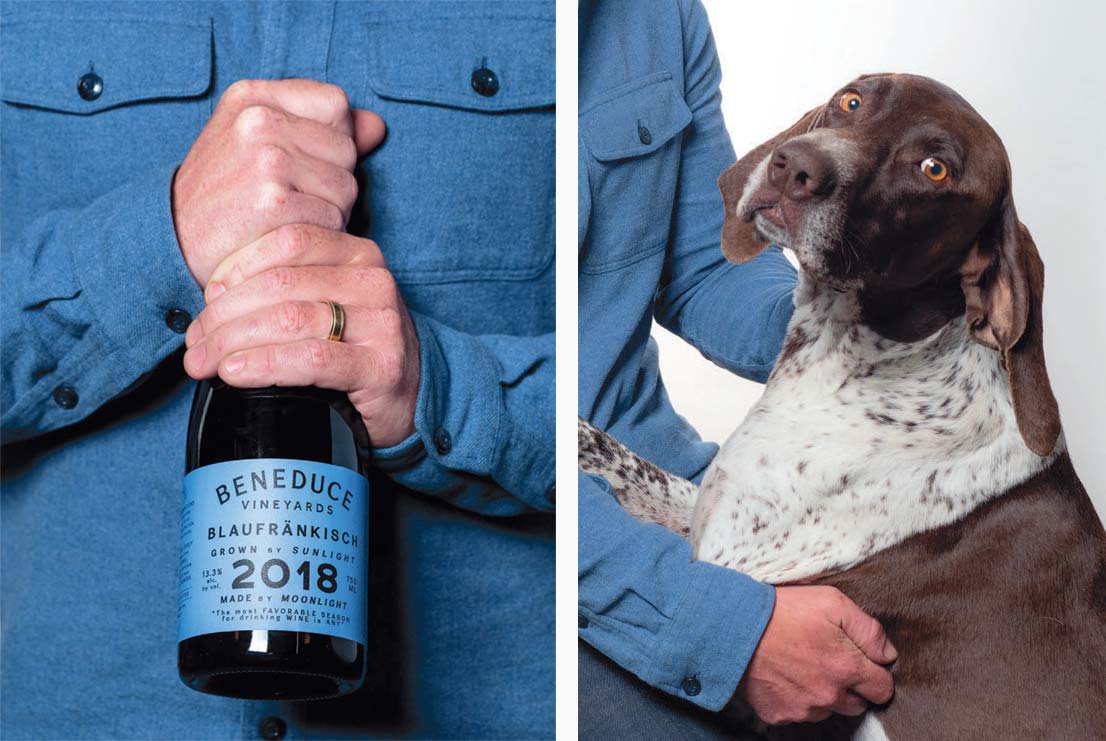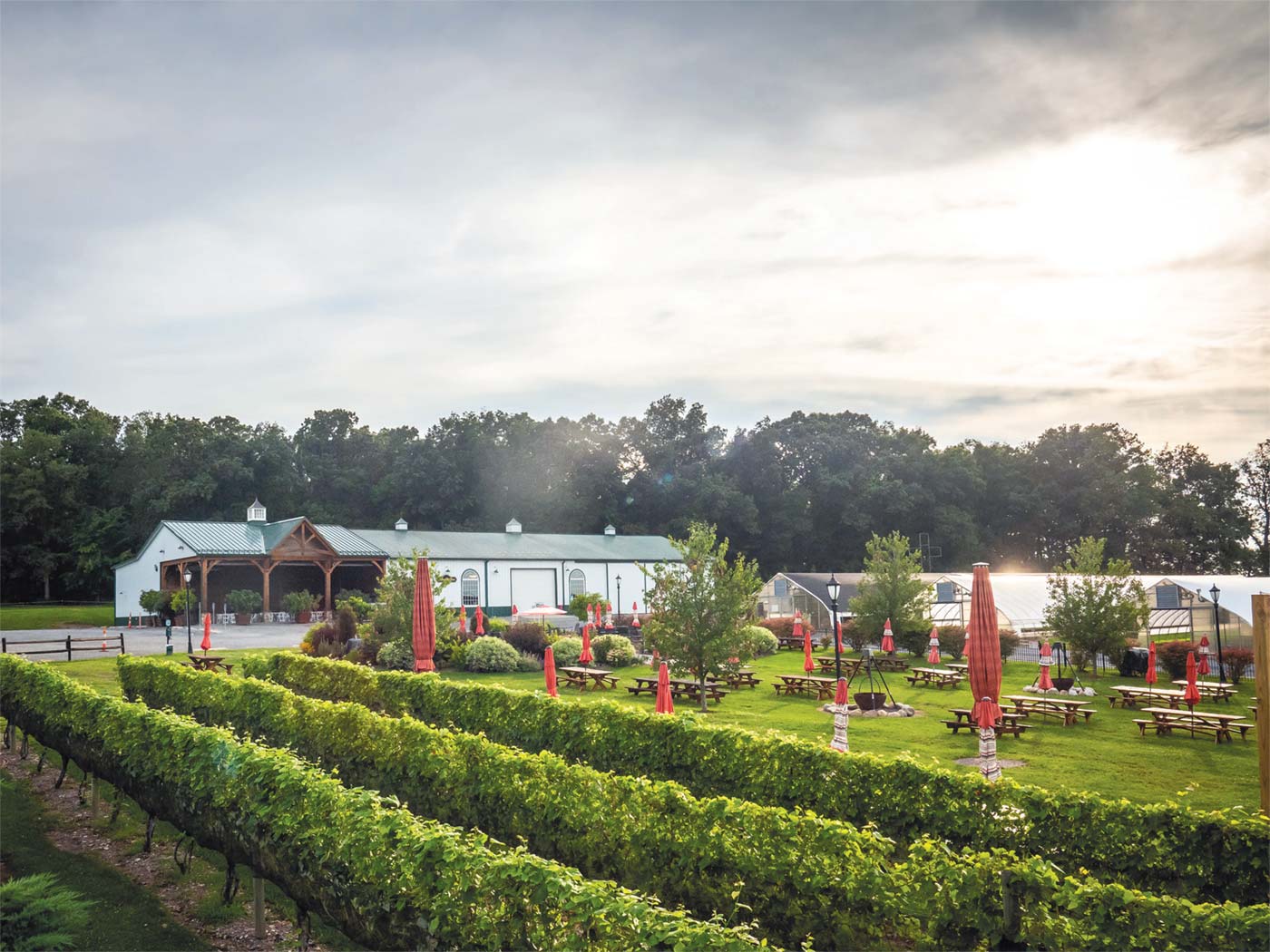Meet Mike Beneduce - Vineyard Manager and Winemaker

Mike Beneduce, vineyard manager and winemaker of Beneduce Vineyards in Pittstown, has a lengthy and an impressive resume. Not only has he made numerous highly regarded wines, Beneduce is a Certified Sommelier under the Court of Master Sommeliers and served as chairman of the Garden State Wine Growers Association. He is a magna cum laude graduate of Cornell University with a double major in plant sciences and viticulture/enology and was named Edible Jersey’s Beverage Artisan of the Year in 2017. A remarkable career to date, there is much more to look forward to: Beneduce recently turned 33.
Hank Zona, a wine events and media professional who has collaborated with Beneduce on a number of projects, sat down recently with him at the winery for this one-on-one.
Q: It’s been a strange and difficult year for you, like most everyone else. How are you doing?
I’m good. We’re good. My wife, Corey, set up her own business—and with her no longer having to commute into the city, we bought an old farmhouse 10 minutes from the winery. We loved Maplewood but this has allowed us to really plug in and feel like members of the community where we work.
Q: What are you doing with all the extra time?
I spend all that saved commuting time working on the house! [laughter] It has also given me more flexibility to easily pop over to the winery to take care of things without committing to a full day there and has allowed us more time for hiking and biking and exploring the river towns in Hunterdon County.
Q: The name “Beneduce” means “good leader” in Italian, and you see that as the goal of the winery: to become a leader in quality winemaking in New Jersey and beyond. Whether you will agree or not, you already are one of the faces of the industry in New Jersey, the person many people turn to first. Do you feel any extra responsibility hearing that?
Well, that’s humbling to hear. I guess I feel the responsibility to do what we set out to do— to honestly and truly focus on quality—and I think eventually that draws people to you.
Q: And you are easier to find because you make particularly good wine, have a well-run operation that people enjoy visiting, and are articulate in speaking about wine in a way everyone can understand. What about the responsibility of having that visibility?
I think my responsibility in that regard is to show emerging producers this can be a viable business model and to show consumers that New Jersey is capable of making quality wine.
Q: What do you say to folks who are considering opening a winery? Other than pointing out the romanticism of all the glory work one does on a farm.
[laughter] I don’t scare them away with that stuff because I honestly do want to see more wineries opening. I think that’s good for all of us—makers and consumers. But I do share my perspective and they may or may not agree with my opinions. I also advise them to be a sponge and see everything as an opportunity to learn.
WE NEED MORE WINERIES THAT ARE WILLING TO PUT FARMING FIRST AND MARKETING SECOND. WE HAVE TO SEE WINE AS HAVING A SENSE OF PLACE, NOT MERELY AS A PRODUCT.

Q: You aren’t operating in a vacuum. How do you stay current?
My favorite way is through travel. Wine can be a very social business and I’ve appreciated winemakers everywhere sharing what they do. There is an instant mutual respect because no matter where you are in the world, the gig sort of plugs you into a similar lifestyle. On the flip side, I really get a lot through my interactions with winemakers here in New Jersey too.
Q: And that is not just your fellow Winemakers Co-op members (a network of Beneduce, Unionville in East Amwell, Working Dog in Robbinsville, William Heritage in Mullica Hill, and Hawk Haven in Rio Grande).
No, I get together to taste regularly with some of the other area wineries and we share ideas and feedback. But it is primarily with the other Co-op members. I really think we have a unique thing going on with that group.
Q: I have had the pleasure to be a part of events with you all. The collegiality is evident, but there is some competitiveness too.
Absolutely. We get along great and have been a great sounding board for one another, and not just this past year when everything got turned upside down. We also push one another to be better. I tasted Todd’s [Todd Wuerker of Hawk Haven Winery] rosé pét-nat (natural sparkling wine) and said, “I need to make mine as good as that!” But the competitiveness really feels more like a healthy sibling rivalry, and we all benefit from our collaboration.
Q: Despite the efforts of Co-op members and others in the industry, there are preconceived notions about “New Jersey wine.” It can be a challenge getting people to know really good wine is being made here.
Which is funny, if you think about it. Why is NJ known for the best sweet corn, tomatoes, and blueberries in the country, but it’s hard for people to imagine quality wine being grown here? Maybe because wine is seen by a lot of Americans as a lifestyle product rather than an agricultural one.
But I think that’s changing and there is good momentum in the right direction. Where we are is such an unsaturated market, within short distances from two major metropolitan areas [Philadelphia and NYC]. Only 2 percent of the wine consumed here in New Jersey is local, compared to Oregon where the number is 40 percent. So there is room to make more inroads with wine drinkers. Customers are now also much more educated and more interested in craft beverages. They definitely don’t want to drink what their parents drank, either, so they are approaching with more of an open mind.
Q: So how does this interest and demand get met?
That’s been an issue for a lot of the state’s smaller producers like us because our production is limited. We need more wineries that are willing to put farming first and marketing second. We have to see wine as having a sense of place, not merely as a product. That means using New Jersey—grown grapes, and preferably varieties that have a real potential to put us on the map as a region. I’m not against hybrid grapes, and we can make good wines from them here, but they’re not going to help us get taken seriously as a quality wine region.
Q: The sense of place is tough, though, because everyone sees the entire state as a one contiguous wine region. But, for example, you are 170 miles from Hawk Haven Winery in Cape May County. In New Jersey, that is significantly different terrain and climate.
Right. In France, that would be driving through three or four different major regions. Which means on one hand we have a lot of variety for our local consumers to choose from, but on the other we don’t have a single grape we can rally around like you saw with Finger Lakes Riesling or Oregon Pinot Noir when those were emerging regions.
Q: Last year was challenging at least if not tragic for so many people and so many businesses.
Like many small wineries, we rely almost entirely on our tasting room operations for sales. We aren’t in stores or found on Drizly so we were faced with the possibility of zero revenue when things shut down. We reacted quickly and pared down expenses and operations where we could.
On the positive side, almost anyone who drinks our wine has seen where it was grown and made. Fortunately, we saw that in time: People were more aware of and interested in supporting local craft producers. We set up a system of online sales, safe contactless pickups and deliveries. We felt pretty good about how we had responded and how we could come out of it eventually.
I WANT TO SEE MORE WINERIES OPENING. I THINK THAT’S GOOD FOR ALL OF US—MAKERS AND CONSUMERS.

Q: But then the frost.
Yes, the frost. In early May of 2020, we experienced a late frost event that wiped out almost 50 percent of the crop even before the growing season really got started. The next morning, seeing all the frost damage, it was the visible epitome of the pandemic to me. I was more than down. It was the low point of my career.
Q: I remember seeing you shortly after and you told me, begrudgingly, but you really didn’t want anyone to know. What did you do?
I didn’t want to feel I was burdening anyone with more negativity three months into the pandemic, especially when so many people were suffering with much more important things. But I have a great support system around me. Corey and I took off hiking for a couple of weeks. I came back feeling reset. I became more fluid. “Be like water,” as Bruce Lee said. [laughter]
The team got closer too during that time because we really didn’t have anywhere else to go. We spent a lot of time together, talking and tasting. The rest of the growing season was really good. We rolled out some new wines and redesigned our entire portfolio. Our new packaging that Corey helped develop not only was immediately noticeable and well-received by customers, it won some design awards too.
Q: Staffing is an issue for so many businesses right now, but really, it always can be an issue. For you, it’s not an issue but a strength.
We’ve been fortunate in that regard. Most of my current full-time staff has been with us for more than half of our existence as a business. A few years ago, when you were here for harvest, you said watching us all work together was like watching a dance. I feel like we have this real harmony at the winery, and it has to affect the quality of the winemaking in a tangible way.
Q: Back to the weather just for a moment. As a farmer, 10—12 years is a bit of a blip on the screen. Some regions like Bordeaux have gotten approval to grow grapes that are more heat and drought resistant, determining the trend will not reverse itself over time. Has it gotten hotter in Hunterdon County? Is the climate changing?
The average temperature has risen a tiny bit but what is more dramatic and significant is how the climate changes. More unpredictability. More spikes in heat and cold. More intense storms. There is some benefit to it getting warmer in having potentially better ripening and longer growing seasons, but not much benefit to the increased variations.
Q: “Natural” winemaking is a hot and divisive topic these days. You are making an orange wine and some naturally sparkling wine not because they are new but because they are long-held traditional winemaking methods for centuries that happen to work well with your grapes, and they meet your interest in being low intervention and sustainable.
Eventually the pendulum always swings back to the center. I think for a long time, wine was seen as a manufactured product. The natural wine movement, for all its faults, has reminded us that wine is a natural product. We’ll be using 100 percent estate-grown fruit this year for the first time ever, and my job in the winery is to let the uniqueness of that fruit shine through, not cram it into the ideological box of what I think it should be.

Q: What is sustainability at Beneduce Vineyards?
As a farmer, you’re sort of forced to look through the lens of sustainability because the only permanent asset we have here is the land.
I believe in the three P’s: people, planet, and profit. Sustainability is more than just the obvious environmental stuff, it’s a holistic business practice: how you treat and train your staff, suppliers, customers. It is also economic. You have to make a profit in order to sustain a business and to continue investing in other areas that need improvement.
Q: In addition to recently moving into Hunterdon County, you also bought some new land nearby to expand your vineyard acreage.
Yes, we were lucky enough to purchase a 26-acre south-facing slope adjacent to our current property and hope to double our acreage under vine over the next 10 years or so.
Q: Explain why it takes that long.
The first 10 years we spent a lot of time figuring out not just the best grape varieties but the best clones and rootstock for our site. We now have a great idea what works best and will plant that in the new vineyard, while also experimenting with some northern Italian varieties that I think should work well here. These are all custom-grafted vines, so they have to be ordered two years in advance, then it takes three to four years for the young vines to mature and produce fruit, and then another two to three years to make and age the wine.
Q: You are a descendant of Italian immigrants who came here and established themselves as rose growers. It was home winemaking that you witnessed growing up, combined with that generational grower culture that drew you to this life. Do you see yourself as a fourth-generation grower or a first-generation winemaker?
I guess both, but I’m prouder to call myself a grower than a winemaker. I do have to thank my dad for exposing me to it as a kid, because home winemaking was so much fun, I’m sure subconsciously a seed was planted in my brain at that age.
Q: Looking back 12 years, would you have done anything differently?
I’m not one for looking back much, but the only thing I might have done differently professionally is taken a “gap year” and gone to Europe to work under a winemaker there after graduation.
Q: I saved this for last, but I know many visitors to the winery who are reading this were hoping it would be at the top. How’s Louie? [Mike and Corey’s German Shorthaired Pointer and winery celebrity]
Louie’s great. Louie has a great life. If I’m ever reincarnated, I want to come back as Louie.
Beneduce Vineyards
1 Jeremiah Lane, Pittstown
908.996.3823
beneducevineyards.com




